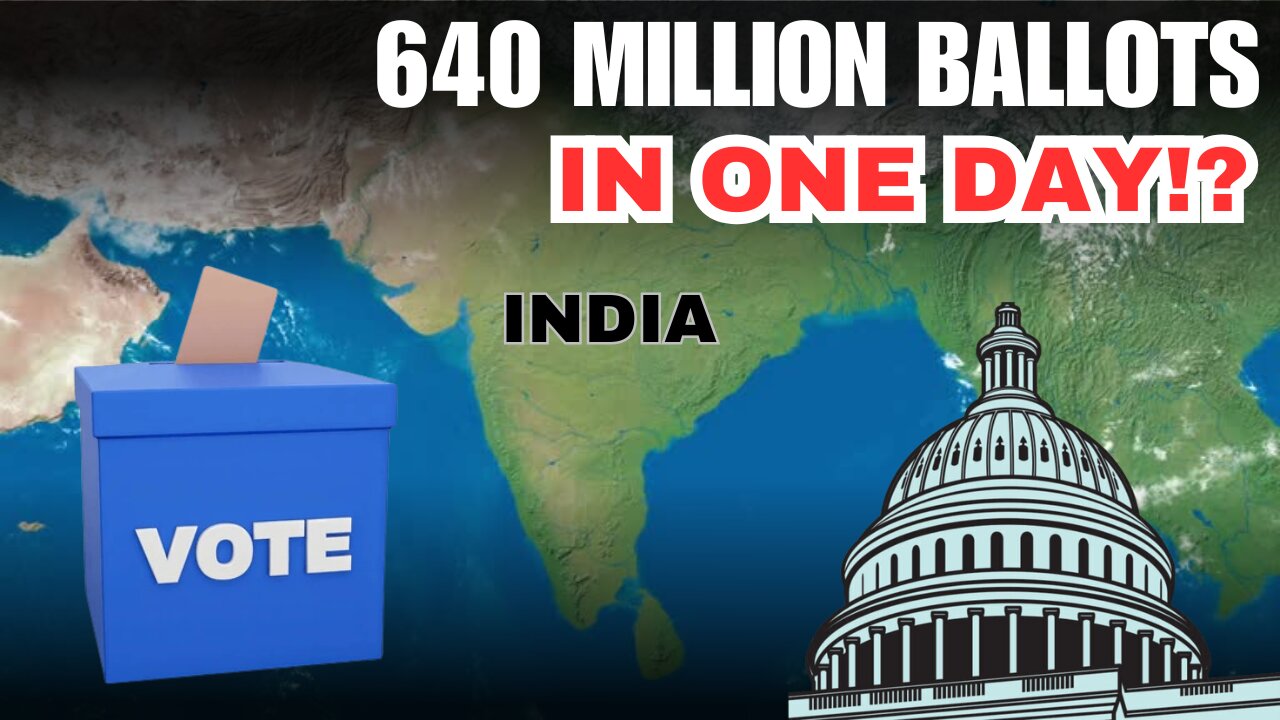Premium Only Content

India Counted 640 Million Votes In One Day!?
ChromoCast #4
**I realized I didn't clarify that in the US the senate and house determine the NUMBER of electors they are not the electors themselves.
Intro:
-Good opportunity to discuss the philosophical differences between the function of the two systems.
- 640 Million votes in one day and were not supposed to be sketched out by the fact that there are still 300k votes left to be counted half a month after the election?
Discussion
- Outcome and Purpose:
- India’s Electoral College prioritizes proportional representation to uphold the principle of democracy in a parliamentary system.
- The U.S. Electoral College emphasizes federalism and state sovereignty to ensure geographical diversity and prevent the dominance of densely populated urban areas.
1. The Irony of Delayed Results
- Elon Musk -"India counts 640 million votes in one day, while parts of the U.S. struggle to count a fraction of that weeks later."*
- Why do these systems work so differently, and what do these differences tell us about how democracy is structured in each country?
- Are these delays just inefficiency, or are they reflective of deeper structural and cultural priorities?
. Structural Similarities and Practical Differences
- Both systems aim to balance representation with democratic ideals.
- Both rely on intermediary bodies (Electoral Colleges) for electing their Presidents.
- India: Prioritizes efficiency: centralized election authority (Election Commission of India) ensures streamlined processes.
- U.S.: Prioritizes Soveriegnty: Decentralized processes mean each state controls its own election systems, leading to variability in speed, accuracy, and procedures.
2. Philosophical Differences Between the Systems
- India: Reflects a parliamentary democracy where proportional representation aligns with its population’s diversity.
- Votes in India's Electoral College are weighted by population, meaning more populous states and regions have greater influence.
- This system is more directly representative of the overall population, as it ensures areas with larger populations have a proportionally larger say in electing the President.
- However, this emphasis on population density offers less protection to smaller or less populous states and communities, increasing the risk of "rule by the majority."
- U.S.: Balances regional diversity in a federal system, emphasizing state sovereignty over pure population-based representation.
- The U.S. Electoral College gives states a mix of population-based electors (House representation) and state-based electors (Senate representation).
- Smaller states benefit from disproportionate representation, ensuring rural and less populous areas maintain significant influence in presidential elections.
- This design creates a hedge against majority rule, where the interests of urban centers could otherwise overshadow rural communities.
- India’s System:
- Philosophical trade-offs:
- India focuses on speed and centralization in its vote-counting process, prioritizing efficiency and inclusivity in one streamlined system.
- Provides a more accurate reflection of the population's overall will.
- Sacrifices the ability to protect less populous states or regions from being dominated by majority populations.
- U.S. System:
- The U.S. system prioritizes checks and balances through federalism, which can lead to localized autonomy but slower results.
- Ensures regional diversity and minority protection by amplifying the voice of rural states.
- Can result in outcomes where the national popular vote does not align with the elected President, reflecting a trade-off between federalist principles and pure democratic representation.
4. Why Delays in the U.S. Matter
-Broader challenges: effects of COVID election changes that were made permanent in many states, decentralized systems (non-uniform changes to election procedures state-by-state), mail-in ballots, and litigation.
-Are delays like these caused by changing and opaque election procedures in some states eroding trust in the system, especially when juxtaposed against a country like India managing over half a billion votes in one day?
5. Broader Implications and Takeaways
- India’s system is more efficient and representative of population size
- The U.S. system is deliberately slower and more complex, offering protections for minority voices ( rural communities)
Should the U.S. adopt a national standard that state election boards must meet for greater efficiency, or does the largely unregulated decentralized approach ultimately protect against national-level corruption and authoritarianism?
-
 3:24:07
3:24:07
Barry Cunningham
7 hours agoJD Vance And Marco Rubio Speak at American Compass Fifth Anniversary Gala | And More News!
66.7K30 -
 2:52:45
2:52:45
TimcastIRL
6 hours agoTrump Admin ARRESTS Boulder Terrorists ENTIRE FAMILY, Preps Deportations | Timcast IRL
184K104 -
 2:40:48
2:40:48
RiftTV/Slightly Offensive
8 hours agoBig, Beautiful SCAM? Elon FLIPS on Trump for WASTEFUL Bill | The Rift | Guests: Ed Szall + Matt Skow
57.3K16 -
 LIVE
LIVE
SpartakusLIVE
7 hours agoSpecialist TOWER OF POWER || Duos w/ Rallied
457 watching -
 3:24
3:24
Glenn Greenwald
7 hours agoPREVIEW: Sen. Rand Paul Interview Exclusively on Locals
95.5K63 -
 3:54:13
3:54:13
VapinGamers
6 hours ago $1.57 earned⚔ 🔥 Blades of Fire - Game Review and Playthru - !game !rumbot #sponsored
37.8K5 -
 9:58:17
9:58:17
ZWOGs
10 hours ago🔴LIVE IN 1440p! - Max Payne 3, Halo Infinite, Marvel Rivals, Splitgate 2, & Maybe Helldivers 2 - Come Hang Out!
14.6K -
 1:14:00
1:14:00
The Daily Signal
7 hours ago🚨LIVE: Democrats Champion Illegals Amid MORE ICE Arrests
45.8K1 -
 5:21:25
5:21:25
RaikenNight
6 hours ago $0.21 earnedFinally got my surgery scheduled! Playing Tainted Grail
9.81K -
 5:06:24
5:06:24
This is the Ray Gaming
6 hours ago $1.52 earnedWelcome to Rumble This is the Ray Gaming
30K2